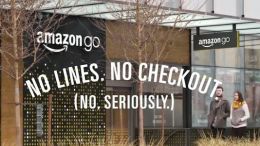We’re getting closer to a future where we don’t ever have to talk to another human we don’t want to.
Amazon announced on Dec. 5 that it will open a grocery store in Seattle, Washington, in early 2017, where customers will be able to walk in, pick up they items they want to buy, and walk out. To achieve this, Amazon will launch an app called Amazon Go (also the name of the store) which hungry customers will use to register that they’re in the store.
Amazon says that through sensors, computer vision, and deep learning, it’s able to track customers as they move about the store, and automatically register which items get picked up. If customers change their mind about an item, they just have to put it back and Amazon will automatically remove it from their bill. All the prepared food (salads, sandwiches, etc.) is handmade, but is sold in boxes, which thankfully are not made of cardboard or held together with Amazon Prime tape.
Amazon imagines its vision for the future as utopian. Customers are tracked as they move around stores, buying their pre-packaged goods, and moving about in silence—cutting down on the massive lines that some grocery stores and lunch spots experience during the work week. However, there’s the very dystopian question of what that all means for the millions of people employed in the US as cashiers.
Amazon already uses robots in its warehouses to move cargo around and bring items to humans to prepare for shipping. It’s also working on creating robots that can scan shelves for items and prepare those goods for shipping themselves. Reverse that process and those same robots could theoretically be used to restock the shelves of an Amazon Go store. In the near future, a store like this could potentially be run almost entirely without humans, barring those employed to prepare the food.
This comes after a drawn-out presidential election campaign in which eventual winner Donald Trump spent much of his time rallying Americans by telling them he would bring jobs back to the US. He recently took credit for saving a few hundred jobs at an air-conditioner factory in Indiana, even though the deal will likely cost taxpayers more than it saved by keeping the jobs in the US. Rise of autonomous vehicles in the next half-decade could decimate the trucking and taxi industries, and that artificial intelligence and natural-language understanding could cull millions of jobs from customer service and other service sectors. Automation could in the near future end up reducing the need for humans in the majority of sectors that they are most employed in today.
Isn’t it exciting ? Please share your comments below…
source:http://qz.com
